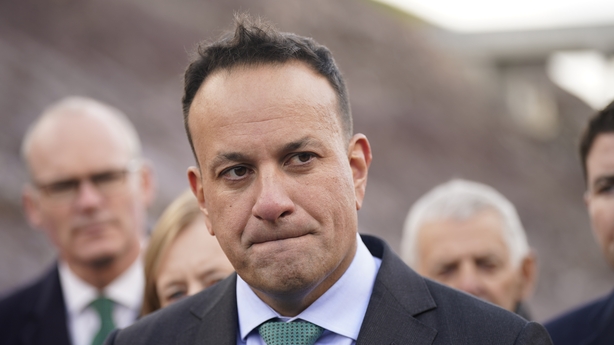Some Irish citizens in Gaza are being notified that their names may be on the list allowed to exit into Egypt tomorrow through the Rafah crossing.
Around 35-40 Irish citizens and their dependents have been trapped in the territory since the conflict escalated in recent weeks.
The development comes as Tánaiste and Minister for Foreign Affairs Minister Micheál Martin is travelling to Egypt.
In a statement, a spokesperson for the Department of Foreign Affairs said: "The Department of Foreign Affairs understands that some Irish citizens may be listed for a departure from Gaza tomorrow.
"We continue to remain in contact with our citizens in Gaza as this complex situation evolves."
Details are limited on how many Irish citizens might exit through the Rafah crossing.
No Irish have been on the list since the conflict escalated leading some opposition TDs, including People Before Profit's Paul Murphy, to suggest that Ireland was being punished for its stance on the war.
Taoiseach Leo Varadkar said that he has no information to support the suggestion that Ireland is being penalised for calling for an immediate humanitarian ceasefire.
During his visit to the Middle East, Mr Martin will visit Israel and the West Bank in the occupied Palestinian Territory where he hopes to meet Palestinian President Mahmoud Abbas.
He will also engage on the situation of Emily Hand, the eight-year old Irish-Israeli hostage.
Her father Tom Hand is in Ireland this week where he has met President Michael D Higgins, the Taoiseach and the Tánaiste.
Speaking on RTÉ's News at One, Mr Varadkar said the situation in Gaza is deteriorating rapidly and Government was not going to change its call for a humanitarian ceasefire.
Such a ceasefire should be observed by all sides, he said, "not just by Israel, also by Hamas, and Islamic Jihad" and it "would allow power, fuel, medicines and aid to get into Gaza, would allow for hostages to be released, would allow for citizens to leave and that is our position".
The Taoiseach said the European Union has called for humanitarian pauses, but the Government believes a humanitarian ceasefire is necessary.

He said: "Some people believe that means Israel not being able to go after individual terrorists. I don't think that's the case. But that's part of the reason why some people won't agree to that language."
Mr Varadkar said it was very encouraging to see French President Emmanuel Macron calling for a ceasefire after the recent humanitarian conference in Paris and US President Joe Biden saying that hospitals should not be targeted and encouraging Israel to not be blinded by rage.
He said it was significant that British Prime Minister Rishi Sunak spoke about violence in the West Bank.
"Hamas can't be blamed for the violence that's happening in the West Bank. The fact he was drawing attention to that is significant, and these countries are allies of Israel. I really hope that the Israeli government will listen," Mr Varadkar said.
The Taoiseach said that he had met with the Israeli Ambassador to Ireland to discuss no Irish citizens being on the lists of people allowed to leave Gaza.
"We're continuing to seek permission for Irish citizens, Irish-Palestinian dual nationals, to leave from Gaza," he said.
"I'm very conscious that we have citizens in Gaza. I'm very conscious that there's a young Irish girl - nine years old this week, Emily Hand - who's being held by Hamas as a hostage in Gaza and let's not forget her."
"In everything we do and say, we're bearing all those things very much in mind, but when it comes to enabling our citizens to leave, we're engaging with Israel on that, also the Egyptians who have a role in controlling the Rafah crossing.
"We've been talking to the Jordanians and the Qataris too, so there's nothing we're not doing to try and enable our citizens to leave," he said.Mr Varadkar also said he was "very conscious" of the Irish troops on the Israeli border in southern Lebanon and that "their safety is paramount" to him.
Additional reporting Paul Cunningham






